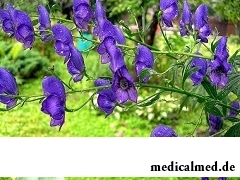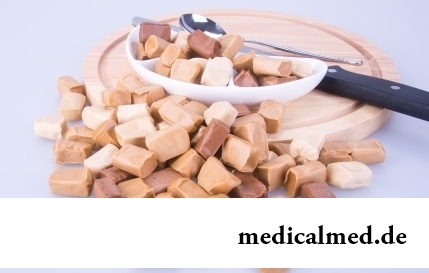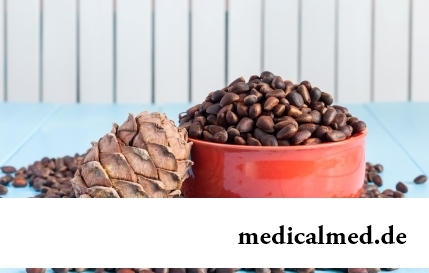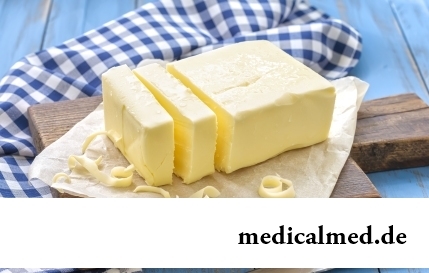





Monk's-hood
Application instruction:

Monk's-hood – a plant from family of a crowfoot family. Other names – monk's-hood Dzungarian, the fighter, the tsar grass.
Chemical composition
Characteristic properties of monk's-hood are caused by its chemical composition including alkaloids macro - and microelements:
- Alkaloids – 0,3-1,07% in stalks, 0,62-3,99% in leaves, 1,38-4,56% in flowers;
- Potassium – 16,3 mg/g;
- Calcium – 11 mg/g;
- Magnesium – 2,7 mg/g;
- Iron – 0,4 mg/g;
- Magnesium – 73,3 mkg/g;
- Copper – 11,3 mkg/g;
- Zinc – 58,5 mkg/g;
- Molybdenum – 0,4 mkg/g;
- Chrome – 0,32 mkg/g;
- Aluminum – 512,8 mkg/g;
- Barium – 54,88 mkg/g;
- Vanadium – 1,04 mkg/g;
- Selenium – 0,11 mkg/g;
- Nickel – 4,0 mkg/g;
- Strontium – 280,8 mkg/g;
- Lead – 0,88;
- Boron – 60,8 mkg/g;
- Iodine – 0,9 mkg/g.
Most of all alkaloids contain in plant flowers.
Useful properties
Interest for medicine is made by leaves and tubers of monk's-hood, however at the same time it is important to remember that they contain poison and therefore demand especially careful address and use is strict according to indications, without exceeding of a dosage.
Use of monk's-hood gained distribution thanks to a wide range of useful properties of a plant in homeopathic and traditional medicine. So, it renders anesthetic, the antiinflammatory, healing, diuretic, sedative action.
Indications to monk's-hood use
The plant is not used by official medicine, and in national – medicinal properties of monk's-hood apply at:
- Arthritis;
- To gout;
- Radiculitis;
- Sciatica;
- Rheumatism;
- Epilepsies;
- Mental, nervous breakdowns;
- Hysteria;
- Neuralgia, including epileptiform neuralgias;
- Headaches;
- Dizziness;
- Parkinson's diseases;
- Anemias;
- Pulmonary tuberculosis;
- Pneumonia;
- To bronchial asthma;
- To cold;
- To quinsy;
- Acute respiratory diseases;
- Deterioration in sight;
- Infection with worms;
- To jaundice;
- Lock;
- Meteorism;
- Cystitis;
- To edema;
- To scarlet fever;
- Diphtherias;
- Malaria;
- Syphilis;
- Psoriasis;
- To mange.
In homeopathy monk's-hood is applied as antiinflammatory, the anesthetic healing means in the form of tincture from flowers and leaves of a plant.
The dosage, in view of hypertoxity of means, is defined by the homeopath after assessment of a condition of the patient.
Contraindications
Monk's-hood Dzungarian is contraindicated to children, people with the lowered pressure, to pregnant women, the feeding women.
After external use of tincture it is necessary to wash away carefully with soap capacity from under means and a hand, and also to avoid hit of means in eyes not to cause damage to a cornea.
At symptoms of poisoning with monk's-hood it is necessary to accept immediately vomitive, to drink oak bark broth, black coffee, wine or solution of vinegar and to urgently call the ambulance.
House drugs from monk's-hood
The nonconventional medicine recommends to apply tincture from monk's-hood to treatment of oncological diseases.
For this purpose take one teaspoon of powder from plant roots, fill in 500 ml of vodka and insist two weeks in the dark room, shaking up every day. Before use tincture is carefully filtered by means of the gauze folded double.
After that it is possible to begin treatment: 1 drop of means is mixed from 50 ml of water (a one-time dosage) and accepted daily to food 3 times a day. Every day add on 1 drop, bring to 10 drops at one time and in such volume three times a day accept 10 more days. Then the dose begins to be reduced and brought to reception of 1 drop 3 times again a day. After that treatment by monk's-hood is stopped, and in 1 month take a course again. Thus conduct seven therapeutic courses.
For removal tooth, a headache (including migraines), treatments of rheumatism, neuralgia, prepare other tincture: 20 g of roots of monk's-hood Dzungarian fill in 500 ml of vodka and maintain week.
At migraine and neuralgia tincture begins to be accepted on 1 teaspoon, gradually increasing a dosage to 1 tablespoon. Treatment lasts month.
For elimination of a dentagra 1 tablespoon of tincture should be rubbed in a cheek from that party where there is injured tooth.
For treatment of rheumatism tincture from monk's-hood is rubbed for the night in a sore point and wrapped up with a flannel.
According to researches, the women drinking several glasses of beer or wine in a week have the increased risk to develop breast cancer.

Insufficiently strongly expressed sexual desire or lack of satisfaction from sexual contacts can test time from in...
Section: Articles about health
Aging — natural and inevitable process. Over time our skin loses elasticity, on it saggings are formed, the face form loses former clearness. The procedure of nitevy lifting (nitevy tightening) can successfully solve this problem. In order that it is better познако...
Section: Articles about health
Epilepsy is one of widespread neurologic diseases. Parents, whose children suffer from this illness, should face rumors and delusions, many of which remained since the Middle Ages....
Section: Articles about health
Food with the increased content of sugar is attractive to most of people - it is scientifically confirmed fact. Business here not in a nevozder...
Section: Articles about health
For most of the working people the problem of having a snack is particularly acute enough. Sooner or later there is a question: what can be eaten quickly between a breakfast and a lunch or a lunch and leaving from service so that to receive necessary power feed, but not an overload...
Section: Articles about health
Smoking not only exerts a negative impact on the state of health of the consumer of tobacco products, but is an air polluter the substances potentially dangerous to people around. In recent years significantly the number of the people aiming to get rid of an addiction increased. Business this difficult: having left off smoking, the person immediately begins to suffer from abstinence. Besides, many yesterday's smokers feel at first great disappointment as улучш...
Section: Articles about health
Smack in a mouth can arise in the natural way – as a result of lack of morning hygiene or reception of the corresponding food. Odn...
Section: Articles about health
The endocrine system carries out extremely important role in a human body, practically all processes of life activity are regulated by it. Closed glands (hemadens) produce special biologically active agents – hormones which then o...
Section: Articles about health
Life activity of one-celled fungi of the sort Candida, related to yeast is a proximate cause of development of candidiasis (milkwoman). Normal these microorganisms are a part of the microflora living in an oral cavity and intestines of most of people and also in a female genital tract. The pathological phenomena are observed when fungi begin to breed too violently. At the same time there is an inflammatory process affecting mucous membranes and which is shown very nepr...
Section: Articles about health
Each person has easy indispositions which he transfers "standing", trying not to ask for medical care. Argu...
Section: Articles about health
For many spouses the question of planning of a family is one of the main. The problem of the choice of effective and safe contraceptives at the same time comes out on top. Russians still not often resort to operation of a vasectomy extremely popular in the USA...
Section: Articles about health
The hysteromyoma is diagnosed more than at a third of women 35 years are more senior. This high-quality new growth which at early stages successfully resolves by means of medicines. It is necessary to resort to an operative measure only when patients too late address specialists, or therapeutic methods do not give the expected effect because of specific features of an organism. Besides, there is a large number of quite effective national...
Section: Articles about health
Osteoporosis this general disease which main sign is decrease in density of a bone tissue. On width распростран...
Section: Articles about health
There comes the season of issues. Many Russians already dream of outdoor recreation, trips, beautiful seaside beaches. At this time there is no wish to think of problems with health and other unpleasant things, however there are subjects which require attention. Summer...
Section: Articles about health
Iodine - one of thirty most important microelements in our organism. The main role of iodine consists in synthesis of thyroid hormones of a thyroid gland - the substances which are responsible for the majority of exchange processes of an organism. It is known that thyroid hormones consist of iodine more than for 65%. The lack of iodine leads to decrease in production of hormones and, as a result, development of a hypothyroidism. The long condition of deficit can become a source of problems of the cardiovascular, bone, digestive SI...
Section: Articles about health
Producers of milk mixes for children assure: mixes are ideally balanced and adapted for needs of babies. In a sluch...
Section: Articles about health
Scientists have no unambiguous opinion on a proximate cause of emergence of a carcinoma cutaneum today. Only the factors promoting development of this illness are precisely established. Treat them: long impact on skin of ultraviolet rays, radioactive...
Section: Articles about health
Within several decades of our compatriots convinced that the use of butter nasty affects a condition of coronary vessels. As a result the reputation of a product was impaired thoroughly a little, and many almost ceased to include it in the diet, having given preference "to safer" to vegetable fats. Meanwhile, the last researches showed that harm of butter for health is strongly exaggerated. But the product has a number of unique properties, to...
Section: Articles about health
Memory is an ability of the central nervous system to fix, keep and as necessary to reproduce information on knowledge...
Section: Articles about health
The phenomenon of the panic attack is known long ago, but the reasons of its emergence still are up to the end not found out. It is established that more than 30% of people at least once in life become the victims of very unpleasant phenomenon: without everyones on that the reasons they have a feeling of horror, with...
Section: Articles about health
Healthy lifestyle today in fashion, and many parents think of that the child from the early childhood played sports. Trainings will help it to become strong and hardy, will improve coordination of movements, and also will exert positive impact on mentality: it will become more collected and purposeful....
Section: Articles about health
Reactive pancreatitis - the disease which is characterized by inflammatory process in a pancreas which arises more often everything...
Section: Articles about health
Venereal diseases in medicine are called the infections which are transmitted preferential sexually, now they and are called - infections, sexually transmitted, or STD. Among them is also life-threatening. In spite of the fact that majority...
Section: Articles about health
Some people consider what for medicine of the 21st century of secrets in the field of health of the person almost does not exist. It absolutely not so. The more answers scientists receive, the more the most difficult questions are raised for them by life. Besides, there are diseases which are not explained with science in any way of which existence people know for 100-150 years. These diseases meet not so often, but from some of them nobody is insured....
Section: Articles about health
The business lady, the become mother, it is necessary to solve an array of problems. But of them is main: how to combine the beloved child and work?...
Section: Slideshow
All of us, unfortunately, should face flu nearly an every year. It would seem, so frequent disease has to be studied already up and down, and each person, at least once by it had (and the number of such people in our country aims at 100%), a dolzha...
Section: Articles about health
Statistically, at the address to doctors seven of each ten patients complain of a headache. Actually it is much more people who are periodically feeling unpleasant feelings such. Many people, apart from a headache the reason for serious fears, prefer to muffle independently the next attack medicines. Such behavior is extremely careless, especially if this symptom appears regularly and is followed by other signs of an indisposition. Constants head Bol...
Section: Articles about health
